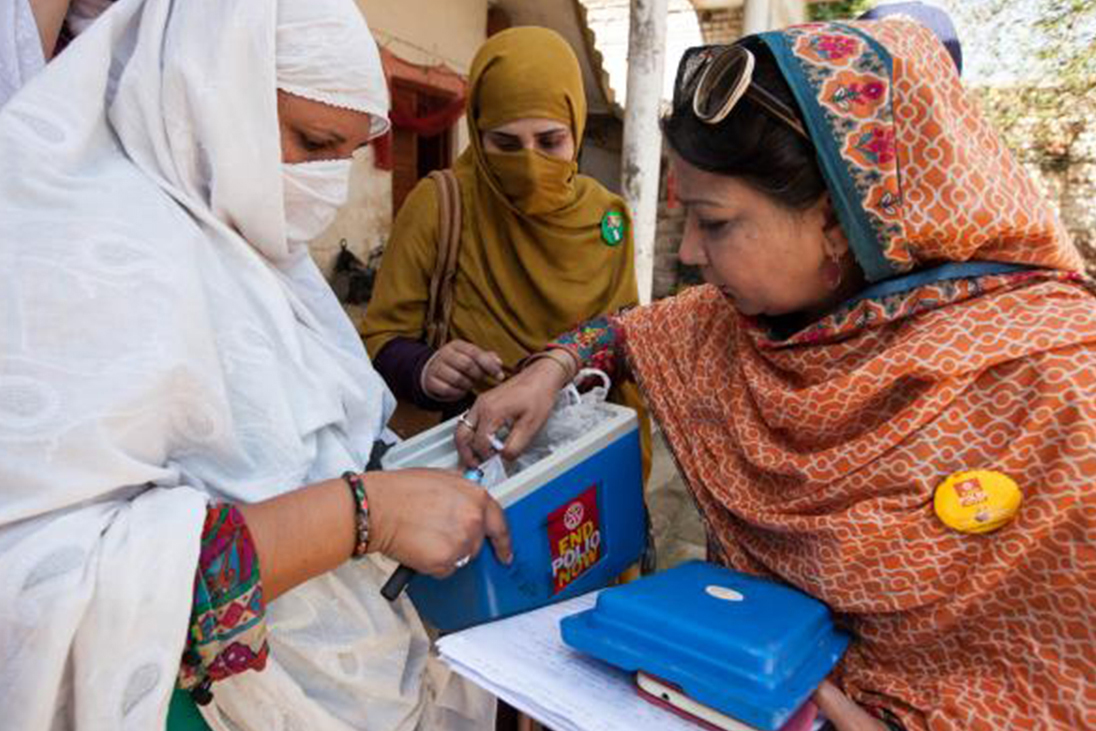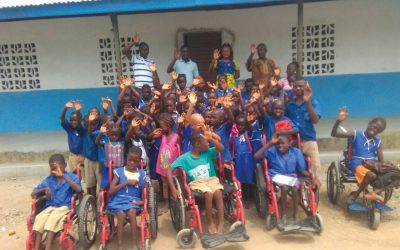There are many challenges on the last mile to eradicating polio and the Global Polio Eradication Initiative (GPEI) is ramping up activities to meet those challenges.
Nigeria has had no cases of the wild polio virus since August 2016, and India has just celebrated five years of being certified polio-free.
Disappointingly, in Afghanistan and Pakistan, there were more polio cases in 2018 than 2017, with 33 cases in total; and the GPEI programme has been extended through to 2023.
Last year, major reviews of the programme were undertaken by an independent team in Afghanistan, Pakistan and Nigeria, with recommendations made by the Independent Monitoring Board.
These recommendations have been incorporated into ‘The Polio Endgame Strategy 2019-2023 Eradication, Integration, Containment and Certification’ which highlights the activities that need to continue, changes that need implementing, and innovations which will be introduced to get to zero cases.
The strategy was presented at the World Health Assembly in May.
The GPEI's new endgame strategy will build on the tried-and-true tactics that got us this far, but will incorporate new strategies to reach all children and #endpolio. https://t.co/PfwFcwCxGj
— EndPolioNow (@EndPolioNow) May 1, 2019
The programme is funded through to 2019 and $3.2 billion must be raised to fund the programme to 2023.
In an extraordinary joint statement made by the chairs of the independent, advisory and oversight committees of the GPEI, they urged everyone to ensure polio will finally be assigned to the history books by 2023.
They made an impassioned plea to everyone to dedicate themselves to one clear objective: to reach that very last child with polio vaccine.
Bill Gates echoed this in an interview with Reuters when he said: “Eradicating the disease – something that has only ever been achieved with one other human disease, smallpox – is proving a long and challenging task.
“We’ve got to get Afghanistan and Pakistan to zero, we need government donors to stay committed.
“The success of the fight against polio and its near-eradication has been a global, collective effort between governments, civil society organisations, health workers, and activists. We must stay committed.”
For Rotarians, this means going the extra mile with fund-raising, volunteering and advocacy.


Tayyaba Gul, from Islamabad (Metropolitan) Rotary in Pakistan, runs a Rotary-funded health centre in Nowshera, Khyber Pakhtunkhwa province, where her team of female vaccinators aim to close the cultural gap that pushes up refusal rates. The group works in neighbourhoods within tribal border regions among ethnic Afghan refugees. Its aim is to convince mothers that polio immunisations are a normal part of postnatal care. “I just contribute my part as a Rotarian. I’m happy to work in remote areas, especially with women, motivating them to play their role in society,” Gul says.
Children are missing out on vaccination for various reasons including lack of infrastructure, remote locations, population movement, conflict and insecurity, resistance to vaccination, misinformation and vaccination fatigue.
In Afghanistan, Taliban leaders are hindering global efforts to end polio by preventing house to house vaccinations.
Political instability and elections also play their part. Fortunately, in Pakistan the new Prime Minister, Imran Khan, is committed to eradicating polio and chaired a meeting of the National Polio Committee.
In January, Dr Tedros Adhanom Ghebreyesus, Director-General of the World Health Organization, visited Pakistan and Afghanistan and commented: “We witnessed first-hand the tremendous efforts being undertaken to interrupt the remaining chains of wild polio transmission there.
The success of the fight against polio and its near-eradication has been a global, collective effort between governments, civil society organisations, health workers, and activists. We must stay committed.”
“I have rarely been so impressed by public health efforts being undertaken as in these two areas, as both countries work hand-in-hand to tackle this joint epidemiological block, as both countries engage and mobilise all levels of public and civil society to support this effort.
“Eradication is an all-or-nothing approach. We either eradicate, or we do not. And the truth is, everything is in place for success to be achieved.
“The Endgame Plan through 2013-2018 has brought us to the brink of being polio-free. And the Strategic Plan 2019-2023 aims to build on the lessons learned since 2013.
“Its aim is to increase performance everywhere, including using the proven tools of eradication and building blocks that have been established, while using opportunities to innovate using local knowledge and insights to overcome obstacles that in the past have seemed insurmountable.
Eradicating the disease – something that has only ever been achieved with one other human disease, smallpox – is proving a long and challenging task.”
“The key is to optimise all these approaches, and if the plan is fully financed and implemented at all levels, a lasting polio-free world will be secured for all future generations to come.
“We commit to making it our overriding objective to find and reach that last unvaccinated child before the poliovirus does. We will give the poliovirus nowhere to hide.”
Rotary International President, Barry Rassin, agrees, pointing out how every Thursday morning he receives an email from the WHO with an update on polio eradication.
He explained: “Every week, when that email appears in my inbox, my heart seems to stop for just a moment until I read the first few lines – and learn whether a child was paralysed by wild poliovirus that week.
“When I open that Thursday email, I don’t wonder what number I’ll see.
“I wonder, was a child paralysed this week or not? We are so close to eradication – but there is work left to do.”
In 2013, there were more than 400 wild polio cases globally—compared to only 33 cases last year. The new Polio Endgame Strategy 2019-2023 uses tried-and-true tools while building on lessons learned to #EndPolio for good: https://t.co/M4zxsNdlD4. pic.twitter.com/RmBAECyoHW
— EndPolioNow (@EndPolioNow) April 30, 2019
If we are to join Barry Rassin’s desire to Be the Inspiration for a polio-free world then we must continue to support our GPEI partners and Rotary colleagues in Afghanistan, Nigeria and Pakistan who are doing outstanding work with dedication and persistence, often in difficult circumstances.
The money we raise through Rotary provides essential grants to WHO and Unicef to fund technical assistance staff, vaccinators, social mobilisation; transportation – trucks, cars, bikes, boats and donkeys, and communication tools – radio and bill board advertising, leaflets, caps, tabards, purple pens.
We distribute $150 million a year in grants, including $50 million raised by Rotary and the $100 million match from the Bill & Melinda Gates Foundation.
We can’t lose sight of the goal, we must remain focused and honour Rotary’s promise to the children of the world.


























































